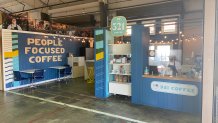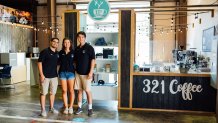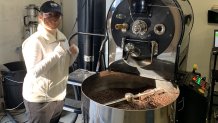It was about time for 321 Coffee to expand to a space of its own when the coronavirus pandemic changed everything.
Suddenly the Raleigh, North Carolina coffee shop known for employing many people with special needs was closed down, and plans for a new space were off the table.
Workers were sent home for six weeks before a limited number returned with masks, plexiglass dividers and other precautions in their space at the State Farmers Market in the capital city.
"For us, pretty much all of our employee base is in that really high-risk, immunocompromised group," CEO Lindsay Wrege said. "So in the beginning, we had to shut things down until we knew more about, was it safe for these people to be coming to work? How do we keep them safe, how do we keep our customers safe?"
For her work establishing a welcoming place for employees with intellectual and developmental disabilities, NBCLX selected Wrege for this installment in our Inspiring America series.
Watch more uplifting profiles on "Inspiring America: The 2021 Inspiration List" on Saturday, May 1 at 8 p.m. ET/PT on NBC and Telemundo (Inspirando a América).
When shutting down, 321 Coffee kept the staff on payroll and didn't set a deadline for employees to return to work.
"We let people make the decision that's best for them, recognizing that we had a lot of different health risks at play," Wrege said. "We definitely had a lot of people not come back until pretty recently, when the vaccine in North Carolina has become more available. ... It's just great to see that in full force again."
Making an inclusive work place

Many people with intellectual and developmental disabilities are unemployed. Of her friend with disabilities who did have jobs, Wrege saw that many were doing menial work but not often up front talking with the customers or working the cash register. So she had the idea to start a coffee business that would be more welcoming.
"Not many people have experience with this community if they don't have a family member with a disability. And so I get this question a lot, but truthfully there's not much difference working with this community as an employee than any other employee," Wrege said. "They want to work, they want to contribute, they want to learn. And we're proud to have a place where we can let them do that."
One way is with individualized job trainings that accommodate the employee — say, a written guide for someone who wants to read and memorize parts of the job.
And that approach extends beyond the training into the work itself.
"We work on having our team bring out the best in others and letting everyone play to our strengths," Wrege said. "Someone who naturally loves to chat, we usually will keep them at the cash register, the greeter role at the pickup counter. But in the slower times, we absolutely want to encourage someone a little more naturally introverted to be in those positions, because they can do it."
And the staff help each other out throughout the day.
"We've got one person on staff who only has use of her left arm, and some of our operations typically require using two hands. So we'll have another barista be that second hand, and sort of fill in and support, but not take over," Wrege said.
What's next?

At first, 321 Coffee didn't have a space of its own and was just giving out free Starbucks coffee on NC State's campus, where Wrege was a student. Soon it was pretty popular with bleary-eyed college students.
Then the business set up at a lot inside the market. Later, that space grew to add seating and more space for food items, and the look for a brick-and-mortar space downtown, currently on hold.
That turned into what Wrege called the "Covid pivot": roasting coffee on the premises. That helped as many customers were staying home.
"We can't guarantee or bank on people coming to the shop, so let's send the coffee to them," Wrege said. "We learned there's a ton to it, down to the beans: where you get them from, what country, what time of year. There's different levels to roast them at, different blends of dark, medium and light."
Now there's an official 321 Blend after some taste tests among employees and the shop's regulars. The shop was selling its blend to individual customers and then expanded to supply 15 local businesses, including Cisco and Pendo.

Maybe the coffee shop gets a new location. Maybe they stick with supplying to more businesses. No matter what, Wrege says she wants to do it fairly.
"There are actually federal rules where you can pay individuals with disabilities, like 20 cents an hour, like sub-minimum wage rates. ... We're trying to say that, hey these people can contribute, can contribute at a really high level, and you can run a sustainable business employing them. And the only way we can make that statement is by paying a strong market rate," she said.
She's not about to take shortcuts either, focused on creating a business that succeeds thanks to its people.
"It's awesome that people come because they love the coffee and they love that they're supporting a great cause while they're doing it. ... We don't want to be a place where people come, they get their cup of coffee, and they feel good about themselves because someone with Down syndrome served it to them, but then dump it out and go get a cup from their favorite coffee shop."
"We want to have a product that's awesome. We say, great coffee and great people."
"Inspiring America: The 2021 Inspiration List" will air Saturday, May 1 at 8 p.m. ET/PT on NBC and Telemundo (Inspirando a América). Encores will be presented the following day on Sunday, May 2 on CNBC at 3 p.m. ET (12 p.m. PT) and MSNBC at 10 p.m. ET (7 p.m. PT). The special will also stream on NBC News NOW on May 2 at 9 p.m. ET (6 p.m. PT) and be available on Peacock on demand.

